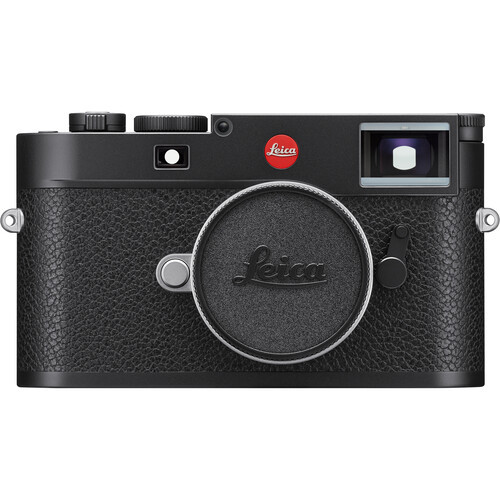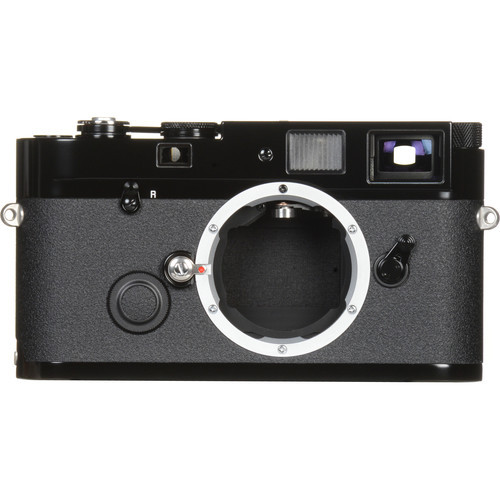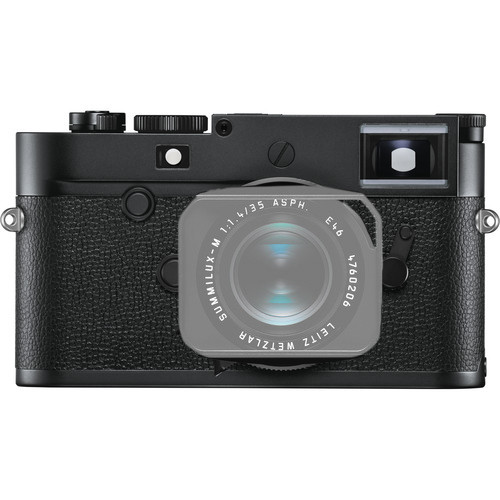Perfectly meshing timeless design with contemporary performance, the Leica M11 is a rangefinder camera featuring a revised sensor design and updated connectivity and while maintaining the familiar design of a Leica M camera.
60MP BSI CMOS Sensor with Triple Resolution Technology
Full-Frame BSI CMOS Sensor
Featuring a new higher-resolution design, the M11's 60MP full-frame CMOS sensor also features a back-illuminated (BSI) design that offers improved noise performance and faster readout speeds. The higher resolution suits more detail-oriented applications, like landscape and architectural subjects, and the noise-reduction benefits of the BSI design improves clarity and color accuracy when working in low-light conditions with higher ISOs.
The sensor's physical design also includes an updated ultra-thin dual-layer filter glass, which absorbs UV and IR wavelengths for greater clarity and more accurate rendering from the M lenses.
Triple Resolution Technology
Besides the 60MP resolution and BSI design, another first for M cameras is Triple Resolution Technology. This unique pixel binning process allows photographers to select 60MP, 36MP, or 18MP output, with each resolution making use of the full sensor area and providing rich 14-bit color. By pixel binning, rather than cropping, the lower resolutions have improved dynamic range and noise levels:
- 60MP: 14 stops of dynamic range, highest resolution
- 36MP: 15 stops of dynamic range, best balance of resolution and noise
- 18MP: 15 stops of dynamic range, lowest noise levels
Maestro III Image Processor
The new Maestro III processor contributes to the faster processing and Triple Resolution Technology of the M11, as well as helps achieve a wider sensitivity range than in past M cameras. An ISO 64-50000 range is now available for greater detail, quality, and natural color rendering at lower ISO settings. The Maestro III also enables continuous shooting at up to 4.5 fps and facilitates fast file saving for an intuitive shooting experience.
Imaging Improvements
The M11 is still a photo-only camera that prioritizes manual operation, but a variety of improvements and functional updates have been made to make the M11 the most contemporary M camera yet:
- An electronic shutter function now permits shooting at shutter speeds up to 1/16,000 sec, which is perfect for working with faster f/0.95 lenses without the need for ND filters. A mechanical shutter still offers shutter speed support up to 1/4000 sec and flash sync at 1/180 sec.
- Two digital zoom steps can simulate working with longer focal length lenses by cropping into the image slightly, at 1.3x (39MP) and 1.8x (18MP) levels. These are reversible crops when recording a DNG or permanent crops if shooting straight to JPG.
- Multi-field exposure metering is available in addition to spot and center-weighted average, which helps reduce the need to meter and then re-compose before shooting.
- Long Exposure Noise Reduction helps to reduce the appearance of noise but can also be disabled for faster saving times.
Traditional Rangefinder Design
The M11 features a timeless design inspired by the original M camera, the M3, from 1954. This classic and recognizable form prioritizes intuitive handling and shooting along with a sleek and minimalist appearance.
Optical Viewfinder and Rear LCD
- The optical viewfinder is a large and bright 0.73x-magnification rangefinder with automatic parallax compensation and bright-line frame lines, which are set to match the image sensor size at a focusing distance of 6.6'.
- On the front of the camera, a viewfinder frame selector can be used to manually change the apparent image field to help visualize the scene with varying focal lengths; options are available in 35mm/135mm, 28mm/90mm, and 50mm/75mm focal length pairs.
- Rear 2.95" 2.3m-dot touchscreen LCD features an updated design that is brighter for for improved visibility in sunny conditions.
- Revised menu layout matches the Q and SL systems for more intuitive navigation and faster settings changes right from the first menu page.
- Live view stabilization helps reduce the appearance of camera shake on the rear LCD or optional Visoflex 2; this electronic stabilization makes it easier to manually focus longer focal length lenses with greater accuracy.
Updated Body Design and Handling
Despite the M11's similarity to past M cameras, it features a variety of notable changes to its body design:
- This black finish version of the M11 features an aluminum top plate with a scratch-resistant coating. This design is about 20% lighter than the silver-chrome version, which features a brass top plate, and weighs 1.2 lb with the battery installed.
- First M camera to not feature a removable baseplate; instead, the M11 borrows a design from the Q and SL systems and uses a new BP-SCL7 battery that is inserted directly into the base of the camera body.
- BP-SCL7 lithium-ion battery has 64% more capacity than the previous generation's battery and is CIPA-rated for 700 shots per charge. However, if working with the optical viewfinder only, approximately 1700 shots per charge is possible.
- Revised design also incorporates a single UHS-II SD memory card slot within the battery compartment.
- Built-in 64GB memory means you can forgo using a memory card altogether, or use the internal memory in conjunction with an SD card to simulate having dual card slots for splitting file types or for overflow storage. Image files can also be transferred from the internal memory to the SD card for easy backup.
- USB type-C port on the base permits in-camera battery charging and file transferring.
Wired and Wireless Connectivity
- The USB type-C port can be used in conjunction with the included FOTOS Cable, which allows direct attachment to an Apple iPhone via the Leica FOTOS app for easy file management and sharing.
- Wi-Fi and Bluetooth can also be used for wireless connecting the camera to an iOS device using the FOTOS app.
- In-app geotagging is possible along with the ability to select favorites and apply ratings to images via your mobile device.
Imaging
Lens Mount Leica M
Sensor Type 35.8 x 23.9 mm (Full-Frame) CMOS
Sensor Resolution Effective: 60.3 Megapixel (9528 x 6328)
Crop Factor None
Aspect Ratio 3:2
Image File Format DNG, JPEG
Bit Depth 14-Bit
Image Stabilization None
Exposure Control
ISO Sensitivity Auto, 64 to 50000
Shutter Speed Mechanical Shutter
1/4000 to 60 Seconds
1 to 60 Minutes
Electronic Shutter
1/16000 to 60 Seconds
Metering Method Center-Weighted Average, Multi-Zone, Spot
Exposure Modes Aperture Priority, Manual
Exposure Compensation -3 to +3 EV (1/3 EV Steps)
White Balance Auto, Cloudy, Color Temperature, Daylight, Flash, Fluorescent (Cool White), Fluorescent (Warm White), Manual, Shade, Tungsten
Continuous Shooting Up to 4.5 fps at 60.3 MP for up to 15 Frames (Raw) / 100 Frames (JPEG)
Up to 4.5 fps at 36 MP for up to 30 Frames (Raw)
Up to 4.5 fps at 18 MP for Unlimited Frames (Raw)
Interval Recording Yes
Self-Timer 2/12-Second Delay
Focus
Focus Type Manual Focus Only
Viewfinder
Viewfinder Type Optical
Magnification Approx. 0.73x
Monitor
Size 2.95"
Resolution 2,332,800 Dot
Display Type Fixed Touchscreen LCD
Flash
Built-In Flash No
Maximum Sync Speed 1/180 Second
Flash Compensation -3 to +3 EV (1/3 EV Steps)
Dedicated Flash System TTL
External Flash Connection Hot Shoe
Interface
Media/Memory Card Slot Single Slot: SD/SDHC/SDXC (UHS-II)
Internal Memory 64 GB
Connectivity USB Type-C (USB 3.1)
Wireless Bluetooth
Wi-Fi
GPS No
Environmental
Operating Temperature 32 to 104°F / 0 to 40°C
Physical
Battery Type 1 x BP-SCL7 Rechargeable Lithium-Ion, 7.4 VDC, 1800 mAh (Approx. 700 Shots)
Dimensions (W x H x D) 5.5 x 3.1 x 1.5" / 139 x 80 x 38.5 mm
Weight 1.2 lb / 530 g (Body with Battery)
1 lb / 455 g (Body Only)
















